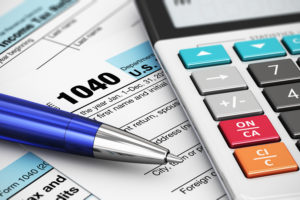Rental Income Tax Rate
In life two things are certain and, as we all know, one of those is taxes. Tax season seems to always be around the corner, and for rental property investors that can mean that some paperwork is on the horizon. Understanding the tax rate for rental income can be an overwhelming task. Between identifying all sources of cash flow and determining potential deductions, some rental properties might demand some diligence when tax season rolls around. Experienced real estate investors should always keep an accurate record of income and expenses to ensure they don’t suffer losses once property taxes and income taxes are due. In this article, we will explore some tips for reporting income taxes for rental properties, some of the potential deductions available to rental property owners, as well as how CT Homes is here to help. With this helpful guide, rental properties can look forward to a simpler tax season. . CT Homes is not a Tax Expert. Please consult with your tax expert for specific tax matters and calculations. Filing taxes for rental properties can be cumbersome at times, but experienced real estate investors tend to follow a few common strategies to take the load off once tax season arrives. If you file income taxes incorrectly for a rental property, you may even run into complications and fees down the line. Some tips for reporting rental income taxes include: When first learning how to calculate taxes on rental income, it’s important to understand that taxes cannot be filed without the correct information. Especially for rental properties that might involve a large number of business expenses, without an accurate record of all rental income figures and business expenses, rental property owners run the risk of suffering larger financial losses down the line in the case of an audit. Any claim for rental income taxes should be able to be verified. Here are the suggested steps for calculating taxes on rental income. When someone asks the question, “how much tax do I pay on rental income taxes?” they must first learn what is considered rental income. Rental income is taxed very similarly to regular income, and tax rates will vary based on the specific property. The IRS defines rental income as payments received for the occupation of a property. Whether that be a condo in the city or a rental house in the desert, any rent payments from tenants would be considered rental income. Rent payments are the most obvious form of rental income, but rental income expenses include any advance rent payments (such as first and last month’s rent), any withheld security deposits (in the case of a deposit not being returned at the end of tenancy), and any expenses paid by tenants rather than property owners (such as certain utility payments that fall on the tenant to assume responsibility for.) Once you’ve figured out all rental income, it’s time to also calculate any property expenses you’ve paid within the past year. Running a rental property might involve a minimal or excessive amount of expenses, so make sure to keep receipts for any surprising emergencies that require fixing. Some of the expenses associated with rental properties include: Expenses are important to identify alongside rental income because rental investors will not have to pay taxes on all of that income. Rental property owners can deduct business expenses when calculating their rental income tax rate. Alongside potential expenses, depreciation also plays a significant role in the rental income tax rates. Ideally, any rental property investment will be in place for numerous years. For some assets, such as property value or machinery, they might become less valuable over time, thus adjusting their tax value. Another deduction that some investors can consider after determining rental income and depreciation, is the Qualified Business Income (QBI) deduction. This deduction is in place for qualified taxpayers to deduct as much as 20% of income received from a pass-through entity such as an S-Corporation, LLC, or in this case, a rental investment property. For those who may own numerous rental properties it’s highly suggested to consult a tax professional to ensure all income and expenses are filed correctly. For real estate owners of apartment buildings, rental homes, or even individual rental units, they must report rental income on Form 1040, Schedule E. This form is where you’ll indicate all rental income, expenses, potential depreciation, and deductions based on the above information. Depreciation values can be calculated using Form 4562. Visit the IRS website for these forms and additional information. Curious what your rental property might be worth? Get a cash offer from CT Homes! Calculated rental income tax rates and potential deductions can be overwhelming, but with access to accurate records, the task is much easier. Just because it’s tax season doesn’t mean that rental property investors have to suffer from financial losses, especially if they have a firm grasp of expenses, deductions, and potential depreciation. CT Homes is not a tax service but provides this article as a helpful guide. If you need help calculating your rental income taxes for an investment property, please contact a licensed tax professional for additional assistance.
Tips for Reporting Rental Income Taxes
How to Calculate Taxes on Rental Income
Identify Total Rental Income
Keep Track of All Rental Property Expenses
Identify All Potential Deductions
How to File Taxes on Rental Income
Optimize Your Real Estate Experience with CT Homes!